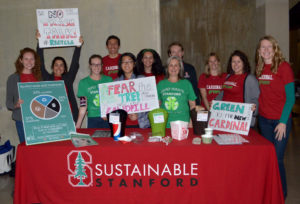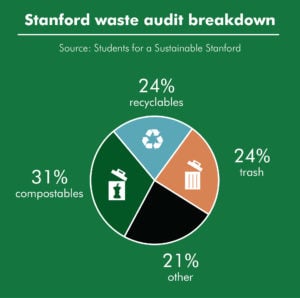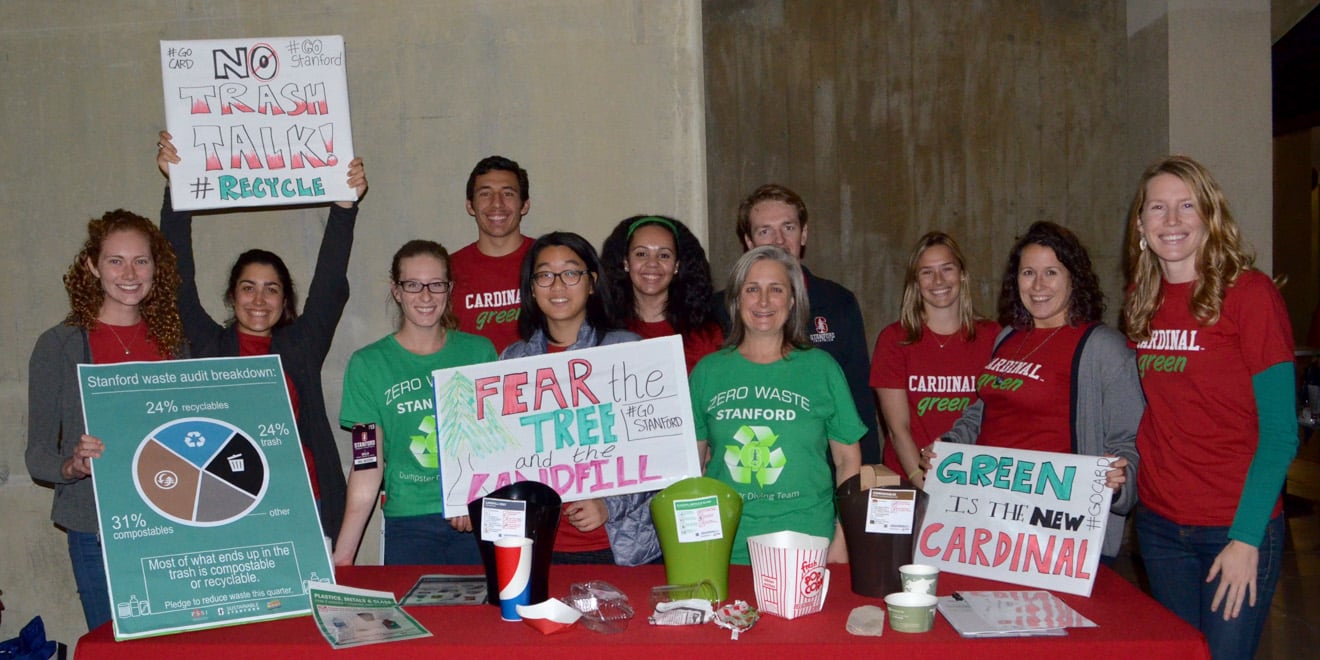This month, Stanford has joined more than 450 other universities nationwide in RecycleMania, an initiative that promotes student awareness about the ecological impact of individual and collective actions.
RecycleMania is a competition that encourages schools to report and track data relating to campus waste. At the end of March, winners are declared in categories including largest amount of recyclables, highest recycling rates and lowest trash levels.
On Stanford’s campus, RecycleMania is coordinated by Stanford’s Office of Sustainability, Building and Grounds Maintenance and Peninsula Sanitary Service, Inc. (PSSI) and the Stanford Recycling Center. The program offers opportunities for members of the Stanford community to learn about concrete changes they can make to improve their carbon footprints. Students can sign up for tours of Stanford’s on-campus recycling centers as well as an off-campus organic processing facility that converts Stanford’s food waste into nutrient-rich animal feed and compost. RecycleMania also runs waste minimization training seminars that provide small groups with the skills to be more waste-efficient in the spaces they use regularly.
“We’re always looking for ways to make sure people are really aware of what can be recycled or composted,” said Sara-Katherine Coxon, the sustainability coordinator for the Office of Sustainability.

Stanford is participating this month in RecycleMania, a nationwide initiative promoting waste reduction at college campuses.
The initiative targets specific areas of campus with high potential for improvement, such as the athletic community.
RecycleMania is partnering with Stanford Athletics to host Game Day Challenges to raise awareness and increase education about waste reduction. Throughout the basketball season, Stanford also competes with other Pac-12 schools to create the least overall waste during games. RecycleMania staff and interns can be spotted in the stands teaching visitors where to dispose of their food purchases and other trash.
“Athletics is one of the places at Stanford with so much room for improvement,” said Andrea Contreras ’19, a member of the Waste Week Committee of Students for a Sustainable Stanford (SSS). “RecycleMania’s main strategy can reach a lot of students that sustainability groups can’t.”
RecycleMania’s initiatives work alongside many of SSS’s events, such as dorm-wide waste education campaigns and dining hall composting, with one shared goal in mind: increased campus awareness about sustainability.
“They’re drawing more attention to a problem where the solution is right there,” Contreras said.
RecycleMania bases its campaign focus areas on the results of Stanford waste audits. Stanford first began conducting on-site landfill-bound waste audits in 2007 due to student curiosity. Since then, student research groups have conducted 28 audits in different parts of campus.

According to Julie Muir, Stanford’s RecycleMania campaign director and PSSI manager, the waste audits are useful as the University reflects on what ends up in landfill and why it took that path.
“We can then think back… What opportunity was missed?” Muir said. “What can we change in our program to prevent this waste?”
Stanford currently diverts about 65 percent of its waste stream into alternative pathways like recycling and composting that extract material and economic benefits from trash. In 2015, that amounted to roughly roughly 8,500 tons of landfilled waste and 16,300 tons of composted or recycled material.
“The cool thing is [that] in 1998, we had 14,000 tons of landfill, so we have seen a decrease for sure,” Muir said.
The state of California aims to achieve 75 percent waste diversion by 2020. In order to bridge the 10 percent gap between this goal and Stanford’s numbers, RecycleMania seeks to emphasize composting on campus. According to Muir, the focus on composting fits the University’s pattern of keeping abreast of California’s statewide eco-friendly progress.
“We’ve been recycling for 40 years on campus, so we’re always ahead,” Muir said. “[Organics are] the largest source of anthropogenic methane, coming out of a landfill — all when this material can be put to work again by composting.”
While implementing composting at Stanford takes time and resources, the coordinators of RecycleMania agree that the most significant challenge is public education about waste diversion. RecycleMania uses techniques ranging from informative signs and training sessions to public events like the Game Day challenges in order to teach community members how to properly dispose of different categories of waste, from compostable café cups to paper trash in office spaces.
“RecycleMania, to me, is an opportunity to target some really easy low-hanging fruit,” Coxon said. “It’s not difficult to take two seconds out of your day to think about how you’re tossing your daily waste.”
Contreras described the recent campus education on waste as helpful to improve her habits.
“Coming from Puerto Rico to Stanford, I had no idea how to recycle,” Contreras said. “The great thing about this campus is that when you’re working with students, everyone has the chance to learn.”
Contact Namita Nabar at nnabar ‘at’ stanford.edu.
